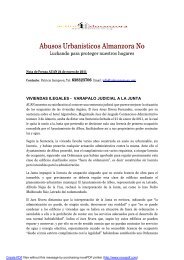European Property Rights and Wrongs - Diana Wallis MEP
European Property Rights and Wrongs - Diana Wallis MEP
European Property Rights and Wrongs - Diana Wallis MEP
You also want an ePaper? Increase the reach of your titles
YUMPU automatically turns print PDFs into web optimized ePapers that Google loves.
since 1994 there are rules to protect buyers. However, these rules only concern<br />
the contractual aspects of the transaction <strong>and</strong>, due to the complexity <strong>and</strong> sensitivity<br />
of property law <strong>and</strong> the differences between legal systems, do not deal with<br />
the property law aspects. 26<br />
Complexity; negative integration<br />
(free movement of persons, services <strong>and</strong> capital)<br />
Besides these positives attempts to harmonise private law, the law of the internal<br />
market, sometimes also referred to as negative integration has effects on property<br />
law. When a person moves to another Member States to establish himself there,<br />
or acquires l<strong>and</strong> as a second residence or as an investment, or seeks to lease the<br />
foreign immovable for profits or hires someone to take care of the l<strong>and</strong> in his absence,<br />
the law of the internal market applies. This law concerns the free movement<br />
of persons, capital <strong>and</strong> services respectively, <strong>and</strong> also has a harmonising effect to<br />
the extent that all similar cases will have to be dealt with in the same manner. 27<br />
The scope to legislate property law<br />
There are major differences between the property law systems of Member States.<br />
However, there is an increasing conviction among academics that these differences<br />
are not such that they cannot be resolved. <strong>Property</strong> law concerns the freedom of<br />
ownership that is at the basis of any functioning economic system, ensuring free<br />
circulation of goods <strong>and</strong> the private entitlement to these. The <strong>European</strong> internal<br />
market, which is sometimes held to be governed by the <strong>European</strong> Economic<br />
Constitution certainly adheres to a concept of freedom of ownership. Contrary to<br />
what sometimes is held, Article 345 TFEU, which states that the treaties do not<br />
prejudice the rules of the Member States governing the system of property ownership,<br />
refers to the principle of neutrality in EU Competition law (meaning that the<br />
26 The differences between systems are not that large in effect. See Sjef van Erp <strong>and</strong><br />
Bram Akkermans (Eds), Ius Commune Casebook for the Common Law of Europe.<br />
Text, Cases <strong>and</strong> Materials on National <strong>and</strong> Supranational <strong>Property</strong> Law (Oxford:<br />
Hart Publishing, 2012).<br />
27 See Bram Akkermans, <strong>Property</strong> Law <strong>and</strong> the Internal Market in Sjef van Erp, Arthur<br />
Salomons <strong>and</strong> Bram Akkermans (Eds.), The Future of <strong>European</strong> <strong>Property</strong> Law (München:<br />
Sellier <strong>European</strong> Law Publishers, 2011)<br />
40<br />
A <strong>European</strong> L<strong>and</strong> Law?



